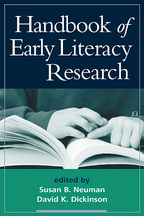
“The Handbook of Early Literacy Research is timely and should be a 'hot' professional reference. The Handbook interrupts 'one size fits all' notions of education and is an important contribution to stimulating local, national, and international dialogues on the literacy needs of all children.”
—Teachers College Record
“Well organized and well edited. Highly recommended for upper-division undergraduates and above.”
—Choice
“An excellent tool for reading specialists, teacher educators, staff developers, and administrators interested in joining the discourse about improving the lives of our nation's children. [This book] will continue to keep literacy on the national agenda as we struggle to give every child a literate future.”
—Education Review
“Neuman and Dickinson have created nothing short of a tour de force. This new Handbook will be essential reading for anyone interested in the topic—and, these days, who is not? Early literacy development is among the most complex current issues facing children, families, early care and education providers, school personnel, researchers, and policy makers. Containing chapters by the leading developmentalists and literacy experts in the nation, the Handbook provides the reader with diverse perspectives, salient analyses, intellectual energy, and simply outstanding scholarship. It is a joy to read and will well earn its place in the annals of scholarship.”
—Sharon L. Kagan, EdD, Professor of Early Childhood and Family Policy, Teachers College, Columbia University; Immediate Past President, National Association for the Education of Young Children
“This volume both celebrates and reports on the vast amount of knowledge gained in emerging and early literacy over the last two to three decades. It encompasses the wide array of perspectives that characterize the current information explosion. Importantly, it also offers guidance for continuing to develop a more sophisticated understanding of such issues as the culturally situated, multiple literacies that are both local and global realities. All of us—educators, researchers, and other students of literacy—need this book.”
—Anne van Kleeck, PhD, Department of Communication Sciences and Disorders, University of Georgia
“With the recent federal focus on early prevention of reading impairments, this handbook provides practitioners and educators with the information needed to provide scientifically based, theory-guided assessment and instructional services to children who are typically developing or at risk for literacy difficulties. Neuman and Dickinson have gathered together an impressive cadre of scientists and educators who inform readers about early literacy research and its application for the home and the classroom. All professionals who work with young children, including general and special educators and speech-language pathologists, should consider this volume a ‘must-have' for their professional library.”
C urrent research increasingly highlights the role of early literacy in young children's development—and facilitates the growth of practices and policies that promote success among diverse learners. The Handbook of Early Literacy Research presents cutting-edge knowledge on all aspects of literacy learning in the preschool years. Volume 1 covers such essential topics as major theories of early literacy; writing development; understanding learning disabilities, including early intervention approaches; cultural and socioeconomic contexts of literacy development; and tutoring programs and other special intervention efforts.